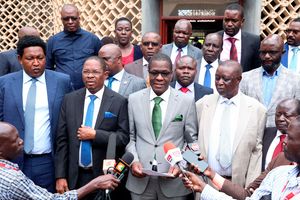Time to try out the bottom-up model in water and sanitation

President William Ruto (left) and Machakos Governor Wavinya Ndeti during the launch of Mavoko Water Supply project in Mavoko, Machakos County on April 14, 2023.
Kenya is a lower-middle-income economy that aspires to join the league of newly industrialised economies with income per capita at higher middle-income levels.
And the Kenya Kwanza administration is implementing ‘The Plan’, comprising the Bottom-Up Economic Transformation Agenda (BETA), where water and sanitation is a key enabler.
Over a long period of time, Kenya has been taken through business-as-usual trickle down model that created a culture of dependence, in part, diminishing entrepreneurial culture.
The transformative restructuring of the economy, including the innovative housing model of development, is expected to turn around Kenya’s economic fortunes to create a prosperous nation.
Tying the housing model to water, sanitation and climate action will be a game changer in the transformation of our country.
Kenya is a water-deficient country and, if unchecked, most of its cities, municipalities and rural areas will run dry without potable water. Hence the need for a ‘radical surgery’ in the sector to ensure progress.
President William Ruto has set a target of having15 billion trees planted in the next decade, providing the missing link in the deliberate development policy to transform the country with enabling adequate water resources.
One of the biggest impediments to the development of the water and sanitation sector is lack of adequate financing. The government’s introduction of public-private partnerships (PPPs) in the development of water and sanitation was bold.
Most water pipelines in Kenya are old and dilapidated, which is one of the key contributors to the non-revenue water calamity that causes a loss of 45 per cent of potable water.
The newly established Water Protection Unit will help to curb the culture of water theft blamed for the Sh11 billion worth of water losses every year.
Investments in climate action will also shape the future of water and sanitation. Innovative financing mechanisms such as embracing blue and green bonds in the Nairobi Securities Exchange will attract the private sector players.
Further, there is a need to review all water tariffs and address institutional duplication to ascertain if they are supporting water and sanitation for all agenda as well as climate action.
A paradigm shift towards more commercialisation of water and sanitation provision is necessary if its universal access is to be guaranteed.
We need to take a leaf from Rwanda in the design of a water sector institutional framework so as to end the multiplicity of fees and charges.
- Mr Biwott is the managing director of Eldoret Water and Sanitation Company (Eldowas) and vice-chairman, advocacy at the Water and Sanitation Service Providers Association (Waspa). [email protected].




